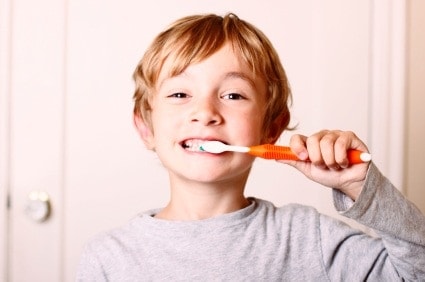Back-to-School Tips for Healthy Teeth
Dental hygiene, good diet and regular checkups make for pearly whites, expert says
The beginning of a new school year is usually a big transition, as lazy summer mornings are quickly replaced by mad dashes to the bus stop.
But a pediatric dental expert warns that your children’s tooth care shouldn’t be lost in the mix.
“In the hustle and bustle of back-to-school, dental care often falls by the wayside,” Gretchen Henson, program director of advanced education in pediatric dentistry in the department of dental medicine at Interfaith Medical Center in Brooklyn, N.Y., said in a hospital news release.
There are some steps children and parents can take to help ensure their teeth stay healthy and cavity-free:
- Brush before breakfast. There is little time to spare on most school mornings. Sometimes kids eat their breakfast on the way to school. It’s not necessary to wait until after breakfast to brush. This will help ensure kids brush their teeth before heading off to school. “The goal is to prevent the pH of the mouth from dropping to an unsafe zone since cavities form in an acidic environment,” said Henson. “Studies show that if we brush before we eat, the mouth’s pH will not dip low enough to form cavities.”
- Don’t micromanage. Some parents tell kids to hold off brushing until after they’ve fixed their child’s hair. Allow children to brush their teeth while their hair is being done so no time is wasted and teeth are clean.
- Consider diet. School meals may contain processed and sugary foods. Parents who pack their child’s lunch should focus on sending perishable items, such as fruits and vegetables, that will provide children with healthy alternatives.
- Don’t overthink it. A little variety is nice, but there is no harm in giving kids the same lunch each day if it means it will be healthier. For example, cutting fruits and vegetables, and adding hummus and pita bread is healthy and convenient.
- Consider shelf life. Packaged foods that can sit on the shelf for a long period of time, such as crackers and pretzels, contain starch. Starch coats the teeth and can breed cavity-causing bacteria. Since kids may get these snacks at school, parents should avoid adding them to their pantry at home. Instead, opt for fresh fruits and vegetables or dried fruits like raisins.
- Choose water. Juice often contains more sugar than children should have in an entire day. This sugar can coat the teeth, promoting tooth decay. Sugar can also lead to an afternoon crash, which interferes with schoolwork. Instead of juice, give kids fruit and teach children to drink water.
- Be safe. Kids participating in organized sports should wear mouth protection. This is particularly true if they play soccer, baseball and basketball. Children should also always wear a helmet when riding bicycles or scooters. Helmets should also be worn when roller skating or rollerblading.
- Seek help. Children who fall on their face should visit the nurse and the dentist. Sometimes issues can develop slowly. A minor problem could actually affect the root of a tooth. If a permanent tooth is knocked out it must be replaced within 30 minutes. Never scrub a tooth that has fallen out, even if it looks dirty. This could kill its root.
- Don’t expect pain. Cavities in children don’t hurt until they become infected. So, some children with cavities may not complain about tooth pain.
- Be careful about braces. Dental care for those with braces is even more important. It can be tough to brush around braces and plaque can build up, leading to permanent damage. Teens often wear braces and hormonal changes that take place during adolescence can alter bacteria in the mouth.
Article originally appeared at: https://consumer.healthday.com
Author: Mary Elizabeth Dallas
